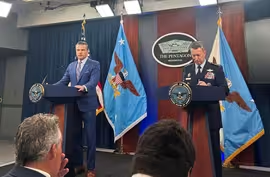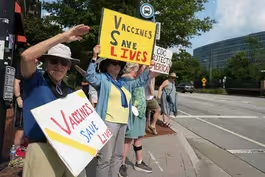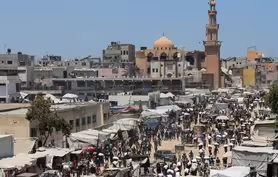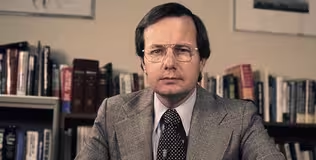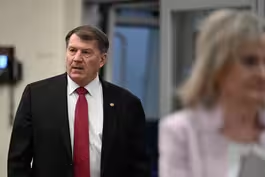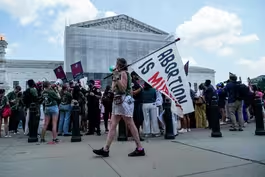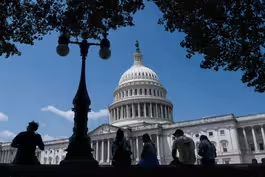
Ksenia Karelina describes life after release from Russia
Clip: 6/26/2025 | 9m 43sVideo has Closed Captions
Ksenia Karelina says release from Russian prison 'feels like starting a new life'
Ksenia Karelina thought she was going to visit family in Russia in January 2024, but authorities there had other ideas. They detained the 32-year-old because of a small donation she made to support Ukraine. They charged her with treason and gave her a 12-year sentence in a work camp. Karelina was released in a prisoner swap with the U.S. and sat down with Amna Nawaz for her first interview.
Problems playing video? | Closed Captioning Feedback
Problems playing video? | Closed Captioning Feedback
Major corporate funding for the PBS News Hour is provided by BDO, BNSF, Consumer Cellular, American Cruise Lines, and Raymond James. Funding for the PBS NewsHour Weekend is provided by...

Ksenia Karelina describes life after release from Russia
Clip: 6/26/2025 | 9m 43sVideo has Closed Captions
Ksenia Karelina thought she was going to visit family in Russia in January 2024, but authorities there had other ideas. They detained the 32-year-old because of a small donation she made to support Ukraine. They charged her with treason and gave her a 12-year sentence in a work camp. Karelina was released in a prisoner swap with the U.S. and sat down with Amna Nawaz for her first interview.
Problems playing video? | Closed Captioning Feedback
How to Watch PBS News Hour
PBS News Hour is available to stream on pbs.org and the free PBS App, available on iPhone, Apple TV, Android TV, Android smartphones, Amazon Fire TV, Amazon Fire Tablet, Roku, Samsung Smart TV, and Vizio.
Providing Support for PBS.org
Learn Moreabout PBS online sponsorshipAMNA NAWAZ: Ksenia Karelina thought she was going to visit family in Central Russia in January of 2024, but Russian authorities had other ideas.
They detained the 32-year-old because of a small donation she made to support Ukraine.
The Russians charged her with treason and gave her a 12-year sentence in a work camp.
But, just over two months ago, she was released in a swap for a Russian held by the U.S. She told me her story earlier today in her first interview since being released.
For Russian-born-and-raised Ksenia Karelina, dance was always her first love.
KSENIA KARELINA, Freed Russian-American Prisoner: I danced since I was 4 years old.
And that was my choice, because I saw ballet at 4 years old, and I begged my mom to send me to do ballet.
And I fell in love with that, and that's what I'm feeling the best doing.
And it's kind of my personal meditation and nothing else exists while I'm dancing.
AMNA NAWAZ: A summer college program brought her to the U.S.
Her new country became her new love.
KSENIA KARELINA: I studied in university in Russia.
And then, for the summer time, I came here to learn English and to see America.
And then I just fell in love with that and decided to stay that year.
AMNA NAWAZ: Why did you fall in love with it?
What did you like about the U.S.?
KSENIA KARELINA: Everything was new.
And it was -- first of all, it was challenging and I'm an adventurous person myself.
Second of all, I like people and culture.
Everyone were pretty open and very welcoming.
And I like the diversity of America, because, in every state, you can go and you can see something new.
And it's absolutely different from what you have seen before.
AMNA NAWAZ: She built a life with work, friends and another love in boyfriend Chris Van Heerden.
But in 2022, as the country of her birth launched a full-scale invasion of Ukraine, she felt moved to act, a small donation online for $51.80 to a charity supporting Ukraine.
Tell me about that moment.
Why did you decide to do that?
KSENIA KARELINA: I remember I was overwhelmed with many feelings, because I also have a lot of Ukrainians around me, same people who -- who moved to the U.S. at some point and who built their life here, but they all have families back in Ukraine.
And I would hear all these stories how their family have to drag through that there.
And I could imagine.
My family is afar too.
So I felt for people there, because they are in that situation all out of the sudden.
They lost their homes.
They lost their regular life.
They cannot feel safe anymore.
And it felt overwhelming for me that someone have to feel that.
I felt it's so unfair.
AMNA NAWAZ: Years go by.
In early 2024, Karelina returns to Russia to see her family.
As soon as she arrives, she's pulled for questioning.
What did they ask you about?
KSENIA KARELINA: So, first, they asked how I'm feeling about this Russian-Ukrainian war, which at that point we couldn't name it war.
We could name it special military operation.
So -- and if I participated somehow, and if I know that America and Russia are now not in the best relationships between each other.
And then they asked to search my phone.
And I gave them the phone because I didn't think I have something to worry about.
AMNA NAWAZ: So they end up charging you with state treason for a donation of $51.80 that you made two years earlier.
When you learn that, that you're going to be charged with this, what do you think?
KSENIA KARELINA: First, I probably couldn't believe that it's real.
Everything seemed so surreal, that I wouldn't be able to capture this idea in my mind that you could be charged for 12 to 25 years in prison for a donation of $51.
AMNA NAWAZ: Karelina pleads guilty on advice of her lawyers, is convicted of treason, and sentenced to 12 years.
In the country she once called home, the ballerina now finds herself behind bars and in a new world.
KSENIA KARELINA: It's constant yelling.
It's constant pointing where you did something wrong by yelling, cursing you, and trying to humiliate you as much as possible.
But no one explains you what to do.
Everyone just punish you when you did something wrong.
All of your world, all out of the sudden just flip upside down, and you don't have anything that you're used to anymore.
You don't have your loved ones.
You don't have your freedom.
It's really scary at first, and your mind going to scary places, and everything that you worked on for 31 years before to build your life of your dream.
And I loved my life a lot.
And it's all just taken away from you.
And at first, you don't see the point why you even have to wake up in the morning now.
Why do you even have to do anything now?
Because you don't have your life anymore.
AMNA NAWAZ: As the months pass, Karelina searches for light in the darkest of places, studying stories of survival through history, reading cards from supporters that tell her she's not forgotten, and filling page after page of journals with Russian poetry and messages to herself like this.
KSENIA KARELINA: "Now I know for sure that love is the biggest power of this world.
While you grow love inside you, you're able to get through anything."
AMNA NAWAZ: You had been detained for nine months at that point.
You're facing down years in prison ahead of you.
How did you write that?
Where did that come from?
KSENIA KARELINA: I feel, the more darkness you overcome, and at this highest point of this darkness, when you feel like you're about to break, if you have enough strength, and if you still stick to your values and you still believe in that, believe in love, believe in light, you're finding it in the small details everywhere around you, and you drag through this time, it helps you to get stronger.
AMNA NAWAZ: On the other side of the world, her boyfriend, Chris, has been receiving letters snuck out of Karelina's prison and fighting for her freedom.
A boxer, he brings on board director Peter Berg, who also runs a boxing gym.
Berg makes the case to Ultimate Fighting Championship CEO Dana White, who then pleads directly with President Trump for Karelina's release.
A prisoner swap for German-Russian citizen Arthur Petrov means that, in April of 2025, Karelina finds herself on a plane to Abu Dhabi.
KSENIA KARELINA: There was a man who comes to me and who says he is John Ratcliffe, director of the CIA, and he shake my hand and he congratulates me and he say: "Welcome back.
Welcome home."
And I remember this wave of warmth through my body, and it's genuinely making me happy.
And I think that's when I was like, that's all.
I'm safe now.
I'm home now.
AMNA NAWAZ: Safely on U.S. soil, her first hug with Chris in 15 months, and a more rambunctious reunion with her dog back home in L.A. You're back at home in Los Angeles.
You're rebuilding a life there.
What is that like for you day to day?
I mean, does this all feel like you're talking about someone else when you share your stories about time and detention?
What's it like day to day right now?
KSENIA KARELINA: So I'm just taking it little by little.
First need to get Chris back to his skincare routine... KSENIA KARELINA: ... which he abandoned while I'm away.
But to tell you seriously, then, yes, it feels like starting the new life now.
And it's a new chapter, for sure.
And I'm now trying to figure out who I'm going to be when I grow up.
AMNA NAWAZ: The light within she fought to hold on to, Karelina now says she's determined to share with others.
KSENIA KARELINA: I feel like I overcame these dark circumstances, and people going through their old darkness.
And I would love to be able to help people to go through that.
I would never want to be in this kind of circumstances.
I would never want to get into prison.
But I feel it gave me more than it took from me.
AMNA NAWAZ: What do you mean by that?
KSENIA KARELINA: It gave me a lot of strength.
It gave me a lot of confidence in my -- again in my values, or it gave me a lot to digest in a way of -- it gave me a lot of growth.
And as it already happened, we just have to make lemonade from lemon which life gives us, right?
And I feel like that's what it was.
I just want everyone to know, whoever is going through hard times, that there will be other days, and it's going to be better.
You just have to fight for yourself and you just have to find the light and small things, which will help to drag you through hard times.
AMNA NAWAZ: Ksenia Karelina, thank you so much.
Such a pleasure to talk with you.
KSENIA KARELINA: Thank you so much for having me, Amna.
AMNA NAWAZ: And you can watch the full unedited interview with Ksenia Karelina on our YouTube page.
Analyzing Iran nuclear damage with former arms inspector
Video has Closed Captions
Clip: 6/26/2025 | 7m 31s | Iran's nuclear program ruined for now, deal needed to keep it that way, ex-inspector warns (7m 31s)
Ex-surgeon general on vaccine panel overhauled by RFK Jr.
Video has Closed Captions
Clip: 6/26/2025 | 7m 9s | Trump's former surgeon general raises concerns about vaccine panel overhauled by RFK Jr. (7m 9s)
News Wrap: At least 18 killed in Gaza strike, hospital says
Video has Closed Captions
Clip: 6/26/2025 | 3m 39s | News Wrap: At least 18 killed as they waited for flour, Gaza hospital officials say (3m 39s)
Remembering acclaimed public TV journalist Bill Moyers
Video has Closed Captions
Clip: 6/26/2025 | 5m 56s | Remembering acclaimed public TV journalist Bill Moyers (5m 56s)
Sen. Rounds says Iran nuclear threat 'seriously eliminated'
Video has Closed Captions
Clip: 6/26/2025 | 6m 45s | GOP Sen. Rounds says Iran nuclear threat 'very seriously eliminated' (6m 45s)
Supreme Court ruling allows states to deny Medicaid funds
Video has Closed Captions
Clip: 6/26/2025 | 6m | Supreme Court clears way for states to deny Medicaid funding for Planned Parenthood (6m)
Who gains and who loses under Trump’s big budget bill
Video has Closed Captions
Clip: 6/26/2025 | 5m 14s | Who gains and who loses under Trump’s big budget bill (5m 14s)
Providing Support for PBS.org
Learn Moreabout PBS online sponsorshipSupport for PBS provided by:
Major corporate funding for the PBS News Hour is provided by BDO, BNSF, Consumer Cellular, American Cruise Lines, and Raymond James. Funding for the PBS NewsHour Weekend is provided by...
